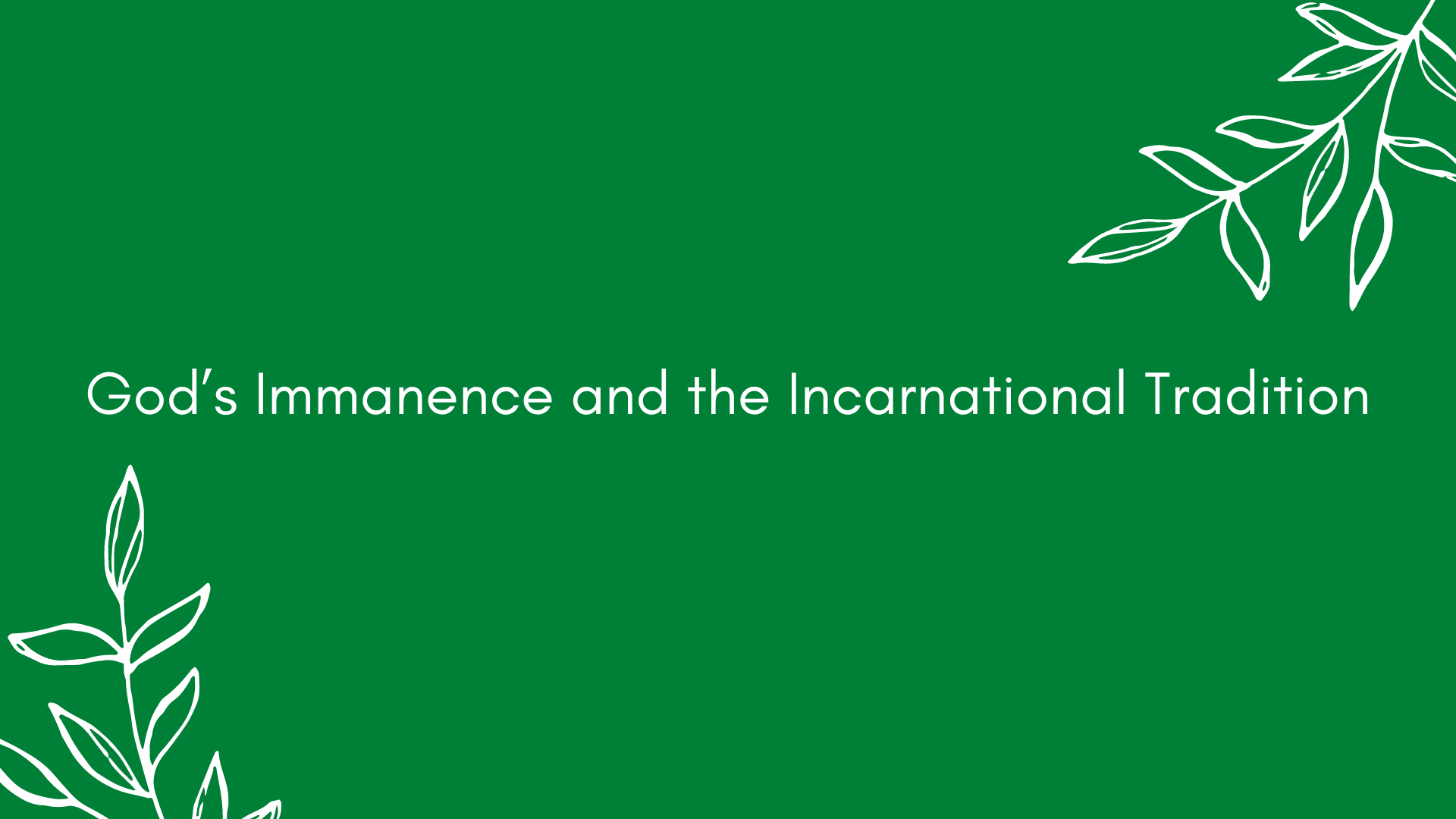I grew up with a sense of God’s transcendence. That is not a word I would have used as a child and teen, but I innately knew that “God is outside of my (and all humanity’s) full experience, perception, or grasp.” I got that. God is way bigger than me. That left me with a sense of awe and reverence for his holiness and greatness in being all knowing, all powerful, and present in all time and places. But I have to acknowledge that was a little frightening and left me feeling removed or distant from him. The truth is, I just didn’t know enough about God.
While my journey of faith started as a child, I became more intentional in seeking God when I went to college. Having left the familiar, secure environment of my home and small town, my life was changing—a lot. I wanted and needed to learn more about the God I believed in who never changes. As I have grown in faith, I have not only come to appreciate that God is transcendent but also immanent. “The immanence of God means that he is knowable, perceivable, graspable.” We can know God and enjoy an intimate relationship with God and experience his nearness.
God’s immanence is an important aspect of ancient Celtic Christianity. God was not a mere theological idea but the Three-in-one God who is present here and now in this place whatever is going on. God’s immanence is the basis for the incarnational tradition. God became incarnate in Jesus. And God is near and incarnated in us in the body of Christ in the world. God dwells near and within us his people through the Spirit.
In his book Streams of Living Water, Richard Foster describes the Incarnational Tradition as “a life that makes present and visible the realm of the invisible spirit,” and we should explore it because “through it we experience God as truly manifest and notoriously active in daily life.”
As followers or apprentices of Jesus we are to learn to heed Paul’s words, “And whatever you do, in word or deed, do everything in the name of the Lord Jesus, giving thanks to God the Father through him” (Col. 3.17).
On my recent Pilgrimage, Adele Calhoun told the wonderful Celtic story about a king who asks his soldiers and his son, “What is the finest music in the world?” The son is quiet. One of the soldiers answers: “A cuckoo calling from highest hedge.” Another responds, “The music that we hear.” Still others respond: “The bellowing of the stag against the river. “ “A herd baying across the way.” “The sound of the lark.” “The whisper of a loved one.”
The king said all this sound very good, but finally the son asks, “Well, tell me, what do you think?”
The king replies, “The finest music in the world is what happens.”
Celtic Christianity affirms that God is in what happens, what is happening to us now. So a key aspect of our journey of faith is paying attention. Being present to Jesus in our marriages and homes and families, in our work places, and society at large. The point is that the Christian life is not some idealized life that we wish we had or hope we will have someday. God is present in every moment, and in everyplace, and every interaction with others because we are living in the kingdom of God right here, right now wherever we are and whatever we are doing.
Celtic bards would tell people to learn to play their own five-stringed harp, which simply means we are to stay in tune with the five sense. The senses (taste, touch, sight, hearing, and smell) are really the only way we can pay attention to what is happening in the present. Because God is in what is happening, “We taste and see that the Lord is good.”
In her book The Celtic Way of Prayer, Esther De Waal describes a woman who upon waking splashes her face with three palmfuls of water invoking the name of the Trinity: “The palmful of the God of Life, the palmful of the Christ of Love, the palmful of the Spirit of Peace, triune of grace.”
As she stirs the embers in the fireplace and they burst into flame, she prays, “God, kindle thou in my heart within a flame of love to my neighbor, To my foe, to my friend, to my kindred all, To the brave, to the knave, to the thrall, O Son of the loveliest Mary, From the lowliest thing that liveth to the name that is highest of all.”
Many Celtic prayers like this were prayed day in and day out. The people payed attention to what was happening and allowed that to draw their attention to God. So they prayed when first waking, getting dressed, milking the cow, going to bed at night. De Waal explains, “In doing all this, the woman has been following the Celtic practice handed down from generation to generation (and known to us because it was orally collected at the end of the last century). It was a practice in which ordinary people in their daily lives took the tasks that lay to hand but treated them sacramentally, as pointing to a greater reality that lay beyond them.
“It is an approach to life that we have been in danger of losing, this sense of allowing the extraordinary to break in on the ordinary. Perhaps it is something that we can rediscover, something which Celtic spirituality can give to us if we would let it renew our vision by teaching our eyes to see again, our ears to hear, our hands to handle…. The Celtic approach to God opens up a world in which nothing is too common to be exalted and nothing is so exalted that it cannot be made common.”
Every day presents us with so many opportunities to see the ways that the kingdom of his heaven is near, but sadly the moment is lost due to lack of awareness. Perhaps the first question is to ask if we really want it. The opportunity to see all that God is doing is at hand, but it does take some intentional seeking on our part. As De Waal writes, “It lies to hand, but it needs a determination on our part to find it. Yet, if we can rediscover this vision, then we too may be able to transform what lies to hand, let the mundane become the edge of glory, and find the extraordinary in the ordinary.”
In her book Spiritual Disciplines Handbook, Adele Calhoun points to the spiritual discipline that can help us. “Practicing the presence is an invitation to see and experience every moment as a gift of God. It is to live alive to union with the Trinity. The desire is to develop a continual openness and awareness of Christ’s presence living in me.”
Adele provides reflection questions to help begin to train ourselves in practicing the presence: Where do your thoughts go when they aren’t focused on work or diverted by amusement? What do these thoughts reveal about your concerns and priorities? How aware are you of the possibility of meeting God during your work day? What is it like for you when God shows up at an unexpected moment? How easy is it for God to get your attention? When are you best able to hear God’s still, small voice? What would it look like for you to intentionally seek deeper intimacy with God?
Adele also suggests some spiritual exercises. Among them is the suggestion to follow the example of the Celtic prayers: “Develop some prayers that help you stay awake to God. For instance, find a verse or prayer that is your waking prayer, your in-the-shower prayer, dressing prayer, your cooking prayer, your driving prayer, and so on. Let these lead you into deeper encounters with God who is there.”
God is imminent, and we are called to live incarnationally. We can experience the nearness of God as we undergo training to learn to play our five-stringed harp engaging all our senses to recognize and practice the presence of our great God who is always with us, near us, in the warp and woof of our everyday, ordinary lives.


